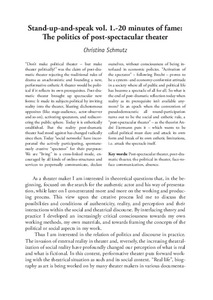Stand-up-and-speak vol. 1.-20 minutes of fame: The politics of post-spectacular theater
Estudis escènics: quaderns de l'Institut del Teatre. 2015, Núm. 41-42
Document typeArticle
Abstract
“Don’t make political theater – but make theater politically!” was the claim of post-dramatic theater rejecting the traditional rules of drama as anachronistic and founding a new, performative esthetic A theater would be political if it reflects its own prerequisites. Post-dramatic theater brought up spectacular new forms: It made its subjects political by inviting reality into the theater, blasting dichotomous opposites (like stage-audience, actor-observer and so on), activating spectators, and rediscovering the public sphere. Today it is esthetically established. But the reality post-dramatic theater had stood against has changed radically since then. Today “social networks” have incorporated the actively participating, spontaneously creative “spectator” for their purposes: We are “living” in a cross-linked mode, encouraged by all kinds of online-structures and services to perpetually communicate, declare ourselves, without consciousness of being interlaced in economic policies. “Activation of the spectator” – following Brecht – proves to be a system- and economy-conformist attitude in a society where all of public and political life has become a spectacle of all for all. So what is the end of post-dramatic reflection today when reality as its prerequisite isn’t available anymore? In an epoch when the convention of pseudodemocratic all round-participation turns out to be the social and esthetic rule, a “post-spectacular theater” – as the theorist André Eiermann puts it – which wants to be called political must dare and attack its own form and break of its own esthetic limitations, i.e. attack the spectacle itself.
Access conditionsOpen Access
KeywordsPost-spectacular theater, post-dramatic theater, the political in theater, face-toface communication, absence
ISSN2385-362X
,
0212-3819


